
If your CRM isn’t connected, your team is constantly playing catch-up.
OnPipeline is a lean, intuitive sales CRM—but its full potential only shines when integrated with the rest of your tech stack. From sales calls to support tickets and marketing campaigns, OnPipeline integrations can automate routine tasks, surface key data in real time, and help you deliver faster, more personalized service.
And the payoff isn’t just theoretical. According to McKinsey, employees spend 1.8 hours per day—nearly 20% of their time—just looking for information or tracking down colleagues. That’s almost a full workday lost each week 1.
In this guide, we’ve selected 10 of the most impactful OnPipeline integration options—each one solving a specific, real-world bottleneck in your sales or support workflows. Whether it’s streamlining follow-ups or unifying communications, these tools turn OnPipeline into a connected command center.
Key Takeaways:
- The best OnPipeline integrations eliminate busywork by syncing calls, deals, tickets, and contacts across your workflow.
- Every tool listed solves a real sales challenge—whether it’s logging conversations, triggering email sequences, or aligning support and CRM data.
- Fast, no-code setups mean less time in onboarding and more time closing deals.
- Smart integration choices keep sales, support, and marketing aligned—reducing delays and missed opportunities.
- It’s not about more tools. It’s about a more connected system that makes your CRM work harder—for everyone on your team.
No more tab-switching. Just seamless workflows.
What Is an OnPipeline Integration?
An OnPipeline integration connects your CRM with the rest of your tech stack—like calling tools, marketing platforms, helpdesk software, or calendars—so data flows automatically, without manual entry.
Instead of toggling between disconnected apps, OnPipeline integrations sync your contacts, deals, tasks, and communications across systems in real time—keeping teams aligned and pipelines moving.
Here’s what that enables:
- Automate workflows: trigger emails, assign tasks, or update records when someone takes action
- Sync data: make sure contact info, deal status, and activity history stay up to date everywhere
- Trigger actions: set off alerts, create follow-ups, or move pipeline stages based on what happens in other tools
One example? CloudTalk’s OnPipeline CRM integration lets teams:
- Call leads directly from OnPipeline CRM
- Auto-log call notes and recordings to deals
- Eliminate tab switching with full caller context in one view
Most OnPipeline crm integrations are built via native apps, APIs, or automation platforms like Zapier.
Want OnPipeline CRM to talk to your dialer, VoIP, and helpdesk?
The 10 Best OnPipeline Integrations to Streamline Sales in 2025
OnPipeline CRM is designed to simplify your sales workflow—but its real superpower comes from how well it connects to the rest of your tools. The right integrations eliminate manual handoffs, keep customer data up to date, and automate repetitive tasks across your entire revenue team.
Below is a curated list of the 10 most valuable OnPipeline integrations in 2025—each chosen to solve a real bottleneck in your pipeline and align with the tools your team already uses.
Integration Summary Table
Software
Category
Why It’s Useful with OnPipeline
CloudTalk
VoIP/AI
Native calling, conversational AI, AI Voice Agents and call transcripts
Salesforce
CRM
Sync account data across both CRMs for sales and reporting
Zendesk
Support Platform
See support tickets alongside deals in OnPipeline
Zapier
Automation
Connect OnPipeline to 5,000+ tools with no-code Zaps
Pipedrive
CRM
Align pipeline activity across both platforms
Front
Shared Inbox
Merge email, chat, and CRM threads into OnPipeline
Zoho CRM
CRM
Sync contacts, forms, and lead activity into OnPipeline
Freshdesk
Helpdesk
Log support activity to OnPipeline and flag customer issues
ActiveCampaign
Marketing Automation
Trigger campaigns from deal activity in OnPipeline
Gorgias
Ecommerce Support
Connect ticketing and CRM data for better post-sale follow-up
1. CloudTalk
CloudTalk is a cloud-based phone system built for sales and support teams that live on the phone. Its OnPipeline integration connects calling with CRM workflows—so reps can place calls, log activity, and access caller data without switching tools.
Use Case:
Make and receive calls from inside OnPipeline CRM, with auto-logged conversations and synced contact records across both platforms.
Benefits:
- Boost rep efficiency with automated call logging
- Give agents full caller context inside OnPipeline
- Reduce time spent switching between phone and CRM
Key Features:
- Real-time call monitoring
- AI-Powered Conversation Intelligence
- Call recording and playback
- Sentiment Analysis
Pricing:
CloudTalk offers flexible plans tailored to business needs. With each of its plans offering more value than its competitors:
- Lite: $19/user/month (Americas)
- Starter: $25/user/month
- Essential: $29/user/month
- Expert: $49/user/month
- Custom: Pricing available upon request
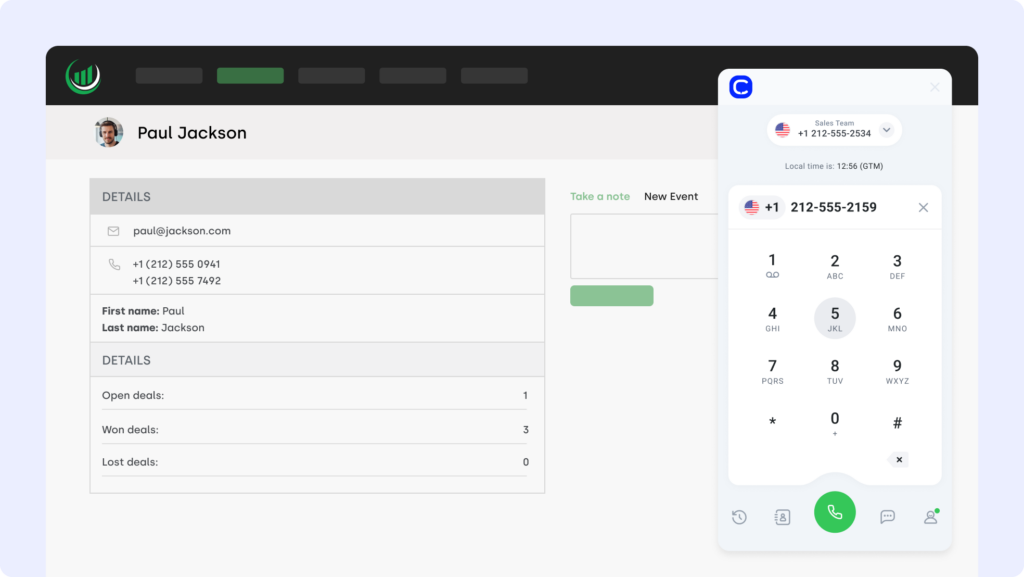
2. Salesforce (CRM)
Salesforce is one of the most widely used CRMs globally. The OnPipeline Salesforce integration helps teams align deal activity, contact history, and lead engagement across both systems without duplicating data.
Use Case:
Sync leads, opportunities, and account records between OnPipeline and Salesforce to ensure sales, support, and marketing are always in sync.
Benefits:
- Eliminate silos between marketing and sales CRMs
- Enable real-time pipeline visibility in both platforms
- Reduce manual data entry and misalignment
Key Features:
- Two-way syncing of contacts and custom fields
- Deal and campaign updates reflected in real time
- Auto-map lifecycle stages across CRMs
Pricing:
Salesforce offers various pricing tiers:
- Sales Cloud Essentials: $25 per user/month
- Sales Cloud Professional: $75 per user/month
- Sales Cloud Enterprise: $150 per user/month
- Sales Cloud Unlimited: $300 per user/month
Salesforce dialer pricing guide
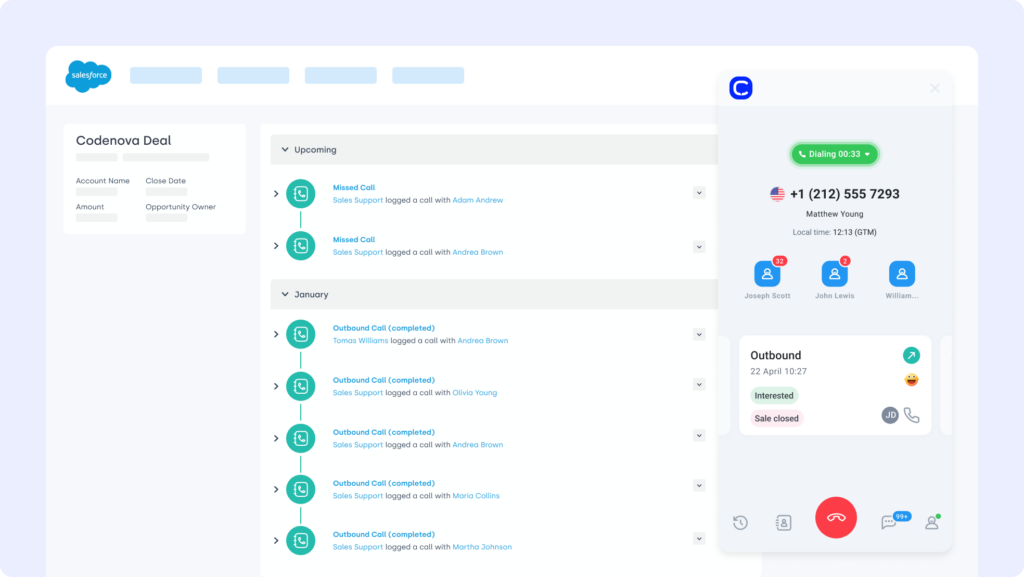
3. Zendesk (Support Platform)
Zendesk is a leading customer service platform known for ticketing and automation. The OnPipeline Zendesk integration connects support data to sales workflows—so reps can see open tickets and customer issues directly in their pipeline.
Use Case:
Auto-sync Zendesk tickets with OnPipeline contact records, giving your sales team visibility into support activity without switching tools.
Benefits:
- Help sales reps spot at-risk deals based on support history
- Align sales and support with shared customer context
- Speed up handoffs and reduce back-and-forth
Key Features:
- Auto-link tickets to contacts and deals in OnPipeline
- Real-time ticket updates inside the CRM
- Trigger follow-ups based on ticket status
Pricing:
Zendesk pricing tiers include:
- Support Team: $19 per agent/month
- Support Professional: $55 per agent/month
- Support Enterprise: $115 per agent/month
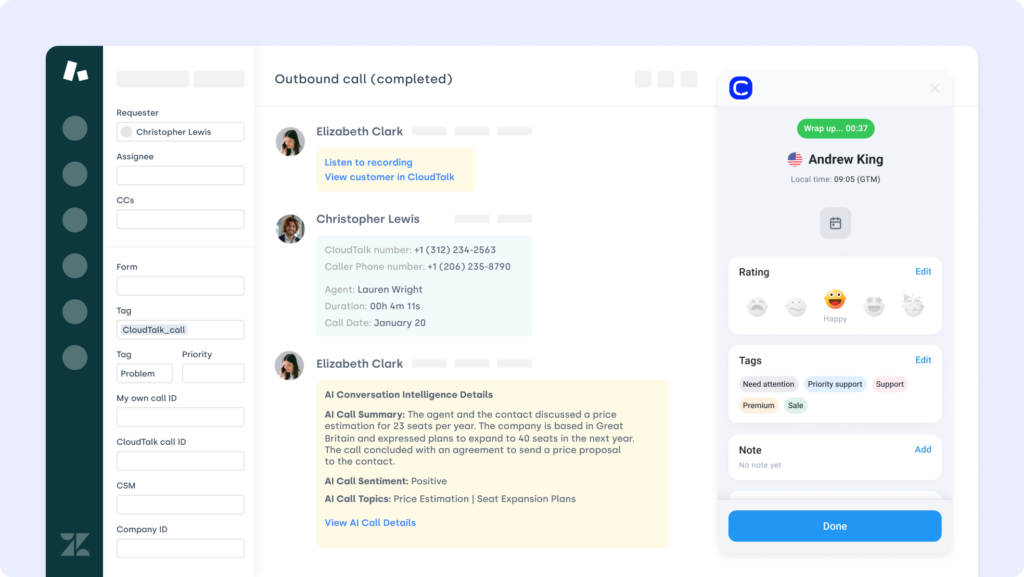
4. Zapier (Automation Platform)
Zapier is a no-code automation platform that connects OnPipeline to thousands of other apps. The OnPipeline Zapier integration lets you create powerful workflows across your stack—without writing a single line of code.
Use Case:
Use Zaps to connect OnPipeline with apps like Slack, Gmail, and Trello—automatically updating contacts, triggering tasks, or moving deals forward.
Benefits:
- Automate routine tasks across your entire toolset
- Eliminate copy-paste work with real-time syncs
- Connect OnPipeline to 5,000+ business apps effortlessly
Key Features:
- Build custom workflows with triggers and actions
- Sync contact or deal updates to third-party apps
- Filter, delay, and schedule automations with ease
Pricing:
Zapier offers various pricing tiers:
- Free: $0/month
- Starter: $19.99/month (billed annually)
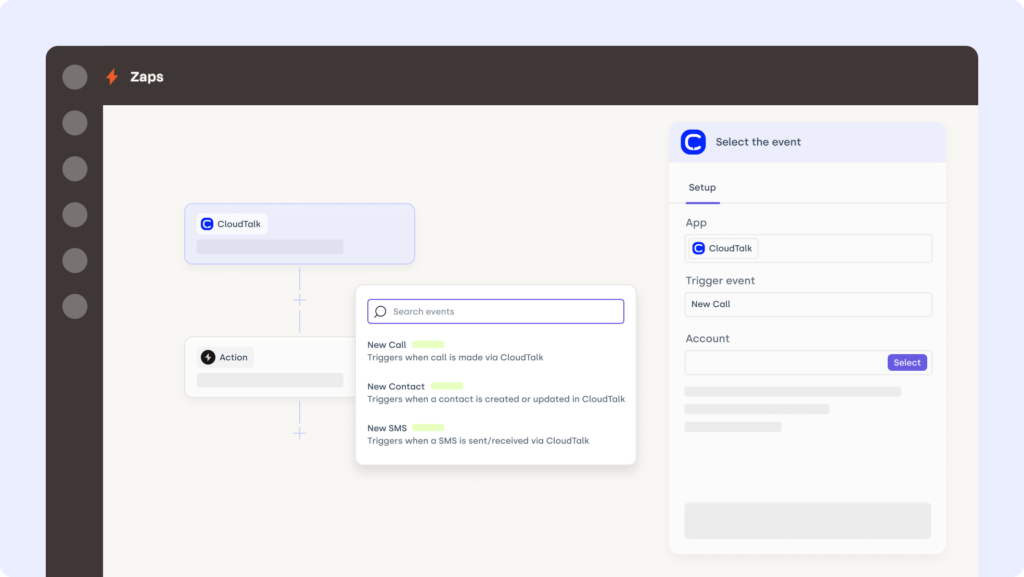
5. Pipedrive (CRM)
Pipedrive is a visual sales CRM that helps teams manage deals, pipelines, and activities. The OnPipeline Pipedrive integration syncs pipeline data and contact records between both platforms—ideal for teams using Pipedrive in parallel or transitioning to OnPipeline.
Use Case:
Automatically sync deal stages, notes, and contact info between Pipedrive and OnPipeline to maintain a unified sales workflow.
Benefits:
- Keep pipelines aligned between two CRMs
- Eliminate double data entry and reduce human error
- Share lead context across platforms for better follow-up
Key Features:
- Two-way syncing of contacts, deals, and notes
- Map custom fields between both systems
- Trigger workflows based on pipeline changes
Pricing:
Pipedrive offers flexible plans based on team size and needs:
- Essential: $14.90/user/month
- Advanced: $27.90/user/month
- Professional: $49.90/user/month
- Power & Enterprise: Custom pricing
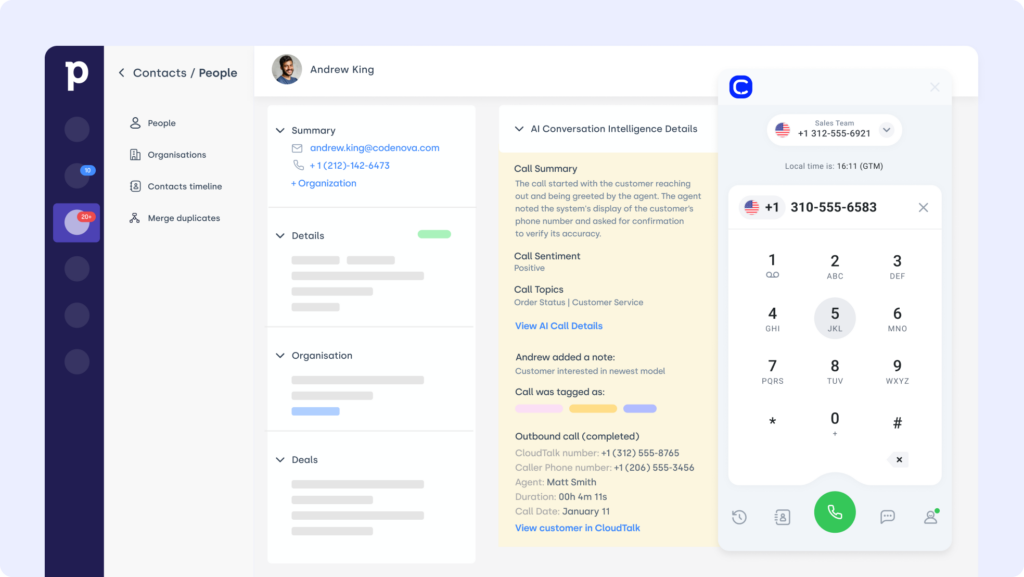
6. Front (Shared Inbox Platform)
Front is a collaborative inbox platform that centralizes email, chat, and support conversations. The OnPipeline Front integration brings communication data into the CRM, so your reps can take action with full context—right from their inbox.
Use Case:
Sync customer messages from Front into OnPipeline, attach them to deals or contacts, and use message activity to trigger follow-up tasks.
Benefits:
- Centralize conversations and deal history in one place
- Improve sales response time with unified communication logs
- Reduce tab-switching between CRM and inbox
Key Features:
- Link Front messages to OnPipeline contact records
- Auto-create tasks in OnPipeline from message triggers
- View message history alongside pipeline activity
Pricing:
- Starter: $19/user/month
- Growth: $59/user/month
- Scale: $99/user/month
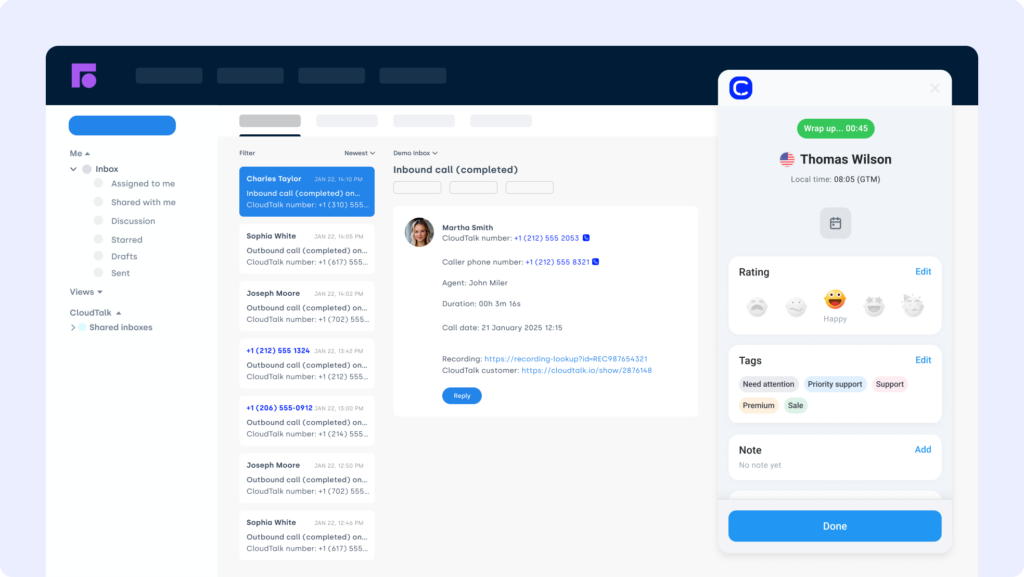
7. Zoho CRM
Zoho CRM is a flexible platform used for sales, marketing, and customer management. The OnPipeline Zoho CRM integration ensures seamless data syncing between both CRMs—perfect for teams collaborating across tools or migrating systems.
Use Case:
Sync lead records, form submissions, and activity logs from Zoho CRM into OnPipeline to ensure consistent data across your sales channels.
Benefits:
- Keep contact records and pipeline activity aligned
- Reduce manual updates between CRM systems
- Enable smoother transitions between marketing and sales
Key Features:
- Two-way syncing of leads and deals
- Auto-import campaign and form data
- Trigger OnPipeline workflows from Zoho updates
Pricing:
Zoho CRM offers tiered plans for teams of all sizes:
- Standard: $14/user/month
- Professional: $23/user/month
- Enterprise: $40/user/month
- Ultimate: $52/user/month
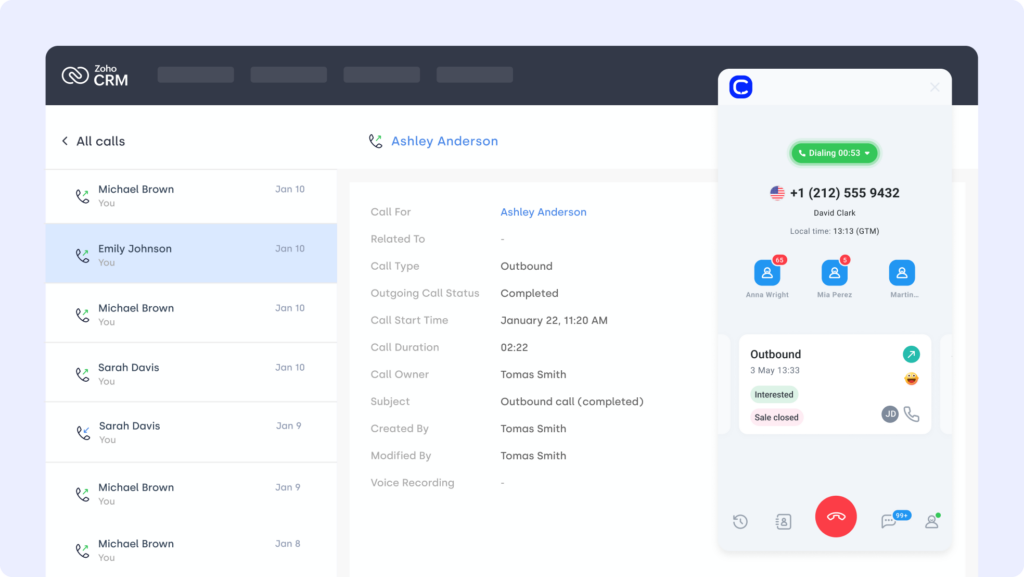
8. Freshdesk (Support Platform)
Freshdesk is a popular helpdesk solution for managing tickets and automating support. The OnPipeline Freshdesk integration brings support visibility into the CRM—so sales can stay informed about customer issues before reaching out.
Use Case:
Automatically link support tickets to OnPipeline contacts and deals, giving sales reps full context during follow-ups or renewals.
Benefits:
- Unify support and sales data in one view
- Flag at-risk deals with open ticket alerts
- Streamline internal handoffs between teams
Key Features:
- Auto-sync tickets to OnPipeline contact records
- Trigger tasks based on SLA violations or ticket tags
- Log support history within the sales pipeline
Pricing:
Freshdesk offers multiple plans for growing support teams:
- Growth: $15/agent/month
- Pro: $49/agent/month
- Enterprise: $79/agent/month
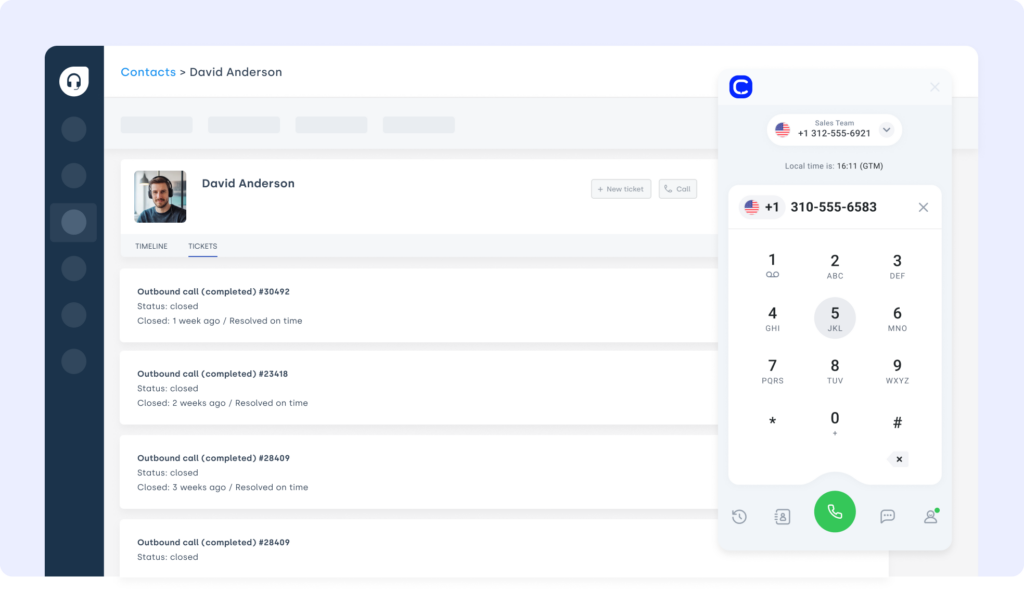
9. ActiveCampaign (Marketing Automation Platform)
ActiveCampaign is a marketing automation and email platform built for targeted outreach. The OnPipeline ActiveCampaign integration connects your CRM with email workflows—so sales and marketing stay aligned on every touchpoint.
Use Case:
Trigger email campaigns based on deal stage changes or form submissions in OnPipeline, and sync engagement data back to the CRM.
Benefits:
- Automate follow-ups and lead nurturing from OnPipeline
- Sync tags, lists, and campaign data without manual updates
- Give sales teams full visibility into email activity
Key Features:
- Bi-directional sync between contacts and custom fields
- Trigger automations based on deal or contact changes
- Track email opens, clicks, and sequences in OnPipeline
Pricing:
- Plus: $49/month
- Professional: $149/month
- Enterprise: Custom pricing

10. Gorgias (Ecommerce Helpdesk)
Gorgias is a support platform built for ecommerce brands. The OnPipeline Gorgias integration connects ticketing activity to the CRM—so reps can respond with context and spot patterns before renewals or upsells.
Use Case:
Automatically attach Gorgias tickets to OnPipeline contact records and trigger alerts when VIP customers open new issues.
Benefits:
- Combine order history and support context in the CRM
- Alert reps when key accounts experience problems
- Streamline follow-ups with synced ticket timelines
Key Features:
- Auto-sync support tickets to deals and contacts
- Trigger CRM tasks based on ticket tags or urgency
- View ticket history inside the OnPipeline deal timeline
Pricing:
- Basic: $10/month + usage
- Pro: $60/month + usage
- Advanced: $900/month
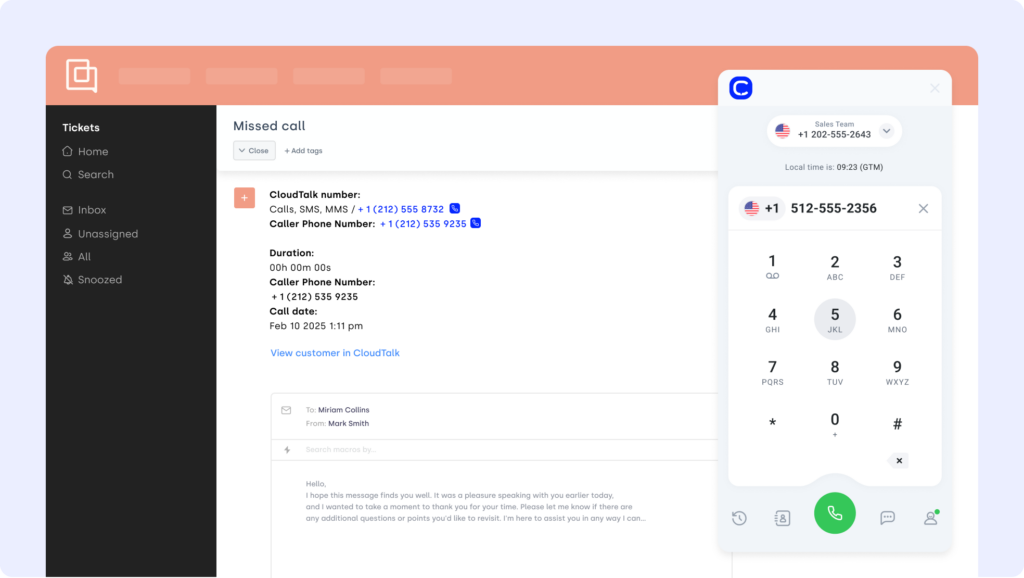
Benefits of OnPipeline Integration
Connecting OnPipeline to your broader tech stack unlocks more than just convenience—it builds a foundation for faster deals, better visibility, and scalable growth. Here are five tailor-made benefits:
- Fewer Tabs, Faster Deals
Reps can make calls, log notes, and trigger follow-ups without leaving OnPipeline—thanks to embedded tools and synced activity. - Stronger Sales-Marketing Alignment
Integrations with platforms like ActiveCampaign or Zoho CRM ensure every contact is nurtured consistently across departments. - Automated, Not Manual
OnPipeline integration tools handle repetitive CRM tasks—like logging emails or syncing ticket updates—so your team doesn’t have to. - Unified Customer History
Bring in ticket data, campaign activity, and call recordings from other tools to give reps full context on every interaction. - More Speed, Less Guesswork
Real-time triggers and synced systems mean no more hunting for the latest update. Everyone stays on the same page, all the time.
Workflows aren’t broken—they’re just disconnected. Reconnect them!
How to Choose the Right OnPipeline Integration for Your Business
Tailored for real-world OnPipeline users.
Identify What’s Slowing You Down
Start with the friction—not the feature list. Are your reps wasting time updating records manually? Are support and sales working in silos? The right OnPipeline integration platform solves a problem that’s already costing you time and revenue.
Choose Integrations That Actually Launch
If it takes dev time and three internal meetings just to get it live, it’s not helping. Prioritize tools with native OnPipeline support or no-code connections. For example, CloudTalk’s OnPipeline integration launches in minutes—no developers needed.
Think Beyond This Quarter’s Pipeline
Can this integration scale as your team adds reps, automates more steps, or grows into new markets? Choose tools—like CloudTalk’s OnPipeline calling integration—that flex with your workflow complexity and support volume.
Prioritize Data Security
Every new connection is a risk surface. Look for OnPipeline phone integrations with clear policies on data handling, user roles, and access control. CloudTalk’s VoIP system supports call logging, audit trails, and GDPR compliance by default.
Make Sure Support Isn’t Just an FAQ Page
When syncing breaks, will you get a bot or a human? Choose OnPipeline integration tools backed by real support—not a 10-step article. CloudTalk’s team is known for fast, human-first resolution when things go sideways.
How to Connect OnPipeline with the Rest of Your Tech Stack
OnPipeline makes it easy to unify your CRM with the tools your team already uses—whether you’re automating sales calls, syncing support tickets, or launching marketing campaigns. From no-code apps to full API access, you’ve got options.
Here’s how most OnPipeline CRM integrations are set up:
- Native Integrations via the OnPipeline App Marketplace
Fast, one-click connections with platforms like CloudTalk, Freshdesk, and ActiveCampaign—no dev work needed. - Third-Party Platforms (e.g., Zapier, Make)
Perfect for automating repetitive tasks. Use Zaps to link OnPipeline with 5,000+ apps like Google Sheets, Slack, or Pipedrive. - Custom API Integrations
For teams with proprietary systems or high-volume pipelines, OnPipeline’s REST API offers full control and flexibility. - iPaaS & Middleware Connectors
Platforms like Integrately or Tray.io help bridge OnPipeline with complex tools like ERPs, billing software, or customer portals.
No matter your stack, the right OnPipeline app integration should eliminate silos, sync your workflows, and scale with your team.
Stop Copy-Pasting Your Sales Workflow—Start Integrating OnPipeline
Manual follow-ups, lost tickets, and tab overload aren’t just annoying—they’re expensive. The right OnPipeline integrations don’t just add features. They remove friction.
Whether you’re syncing calls, automating emails, or pulling support data into your CRM, one well-chosen integration can streamline your entire pipeline.
Ready to cut busywork and close faster? Try CloudTalk’s OnPipeline integration today.
It installs in minutes—and starts paying off even faster.
Setup shouldn’t be a separate project. We can help you.
Sources:












